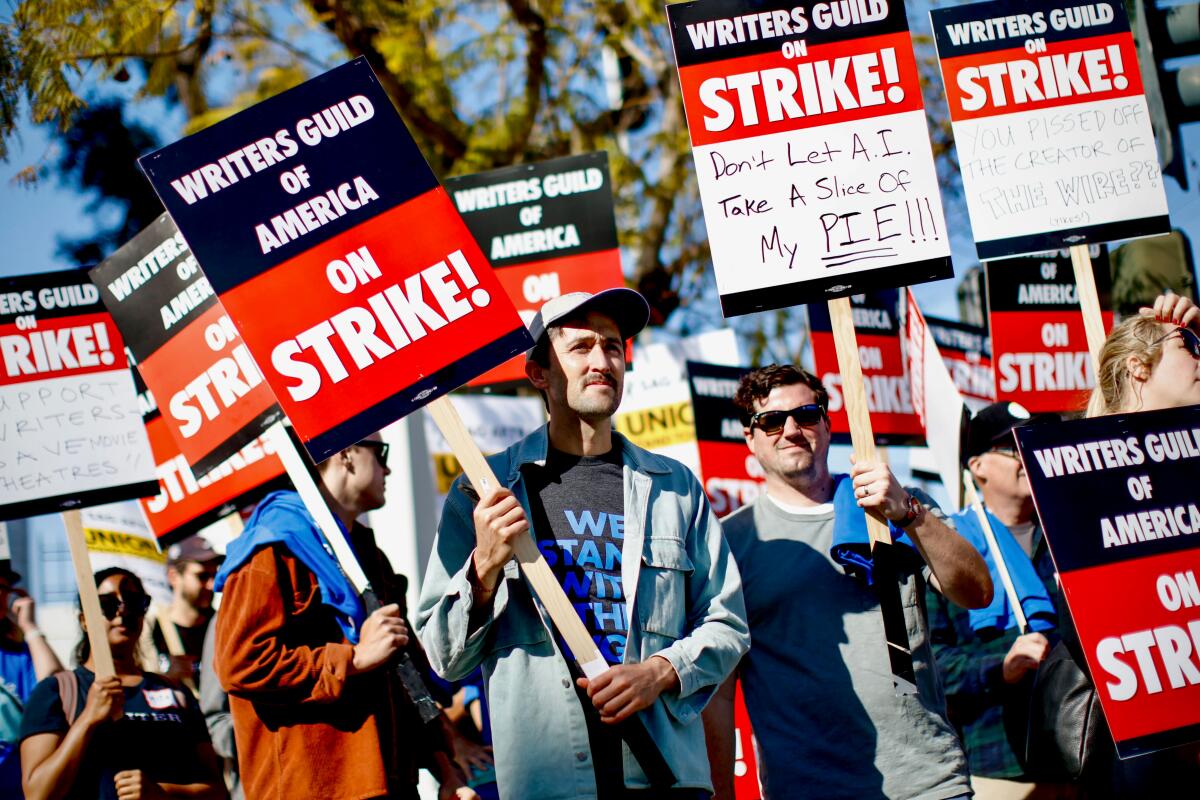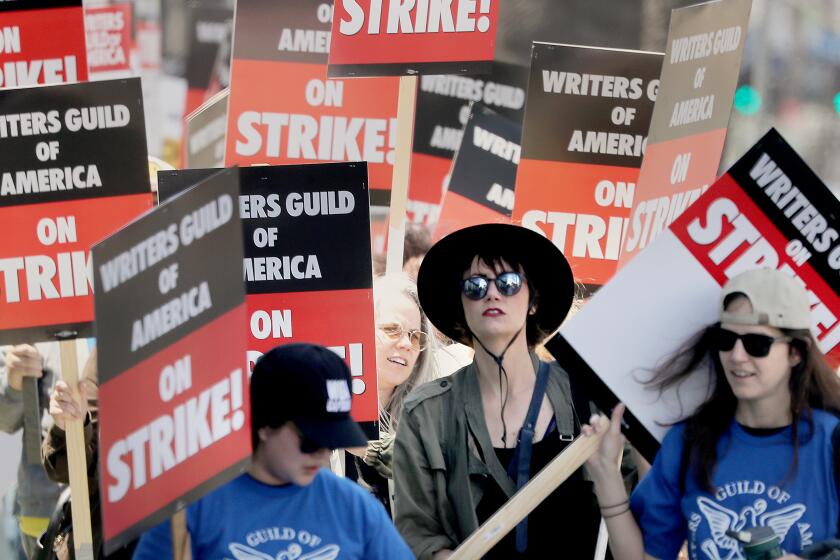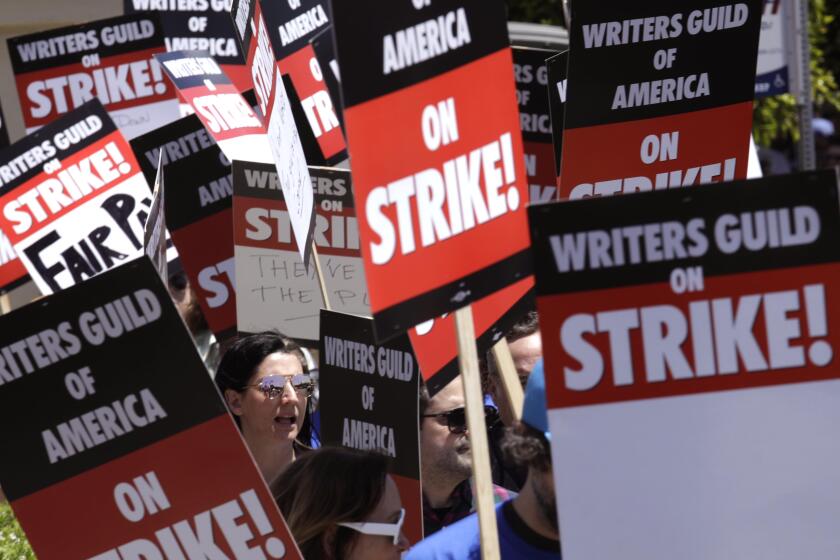Opinion: Want to understand the writers’ strike? Start with the new writers’ room

- Share via
In 1995, I graduated from the University of Iowa’s Playwrights Workshop, and that same year Universal Studios optioned a screenplay I had written, earning me a union card in the Writers Guild of America.
For the first time in my adult life I had health insurance and a pension plan and an office in Barry Kemp’s production company (creator of “Newhart” and “Coach”). Three years later in 1998, I adapted an original stage play of my own as a screenplay, and that movie, “Jerry and Tom,” earned a spot at the Sundance Film Festival. That movie got me my first TV writing job, a summer replacement series for ABC titled “Maximum Bob.”
My second job writing for TV was for Season 1 of “The West Wing,” and my title on that series was co-producer. In 2000, I shared an Emmy Award for outstanding writing for a drama series with Aaron Sorkin, the show’s creator. It was only my second episode of television. Later that same year, I went to work on “Six Feet Under” during its first season, and I stayed with the series through its finale in 2005. After that I did stints on “Mad Men” and “Nurse Jackie.”
In the days before the Writers Guild of America called on members to strike, the creators of hit shows, including ‘Shrinking,’ ‘The Last of Us’ and more, gathered to discuss the state of the industry.
By then I had not only written scripts, but helped cast them, worked with directors and supervised production on set and in editing. I learned the ropes of television production, going from co-producer up the ranks to executive producer, earning five more Emmy nominations along the way.
In 2010, I was hired as a writer and co-executive producer on Netflix’s first big original content production, “House of Cards.” This was streaming television in its infancy. The first offer from Netflix that came through my agent was for less money than I had been paid in my first job 12 years earlier. In spite of Kevin Spacey’s and David Fincher’s star power and a $100-million budget, my agent was told it was a “web series,” a new era of guild jurisdiction not yet subject to the minimums writers earn today. Luckily, Netflix blinked and the offer got real — I was paid my customary per-episode fee.
On “Six Feet Under,” we would write and produce 12 episodes over nine months. On “House of Cards” the production timeline would stretch by months and for fewer episodes. A few years later I got hired for Season 2 of “Man In The High Castle,” Amazon’s first big streaming series. Those 10 episodes took almost a full year to write and produce. I didn’t know it at the time because I was still making my per-episode amount, but I was making less and less money because it was taking longer and longer to produce fewer episodes.
Television’s most recent ‘Golden Age’ set off a gold rush that transformed Hollywood. The writers’ strike means the boom has finally gone bust.
Over the length of my career, I’ve been able to get married, buy a house and, with the lion’s share of the work being done by my wife, Mary, raise three kids. My family and I have needed that health insurance more times than I can count. It’s been a literal lifesaver.
Somewhere in the last few years, most TV writers have started working under limited 20-week contracts. The entire season gets written during those 20 weeks — before production begins — and at that point all the scripts are banked and all but a couple of writers are let go.
For the majority of younger writers working today, that’s the structure they know. They don’t cast their episodes and never set foot on set during production. That one change has made it so much more difficult for younger writers to do any of what I was able to do. If I were starting now, I wouldn’t have been able to stick it out and make a career for myself.
Hollywood writers on Tuesday formed picket lines in L.A. and New York after the Writers Guild of America called a strike to demand better pay from streaming and improved working conditions.
Is this an instance of high-paid scribes crying, “My diamond shoes are too tight?” Maybe to some. That we are paid better than teachers or nurses is worth a separate discussion elsewhere. But the bottom line is this: The corporations that pay us made $28 billion in 2021 compared with $5 billion when I won my Emmy, in 2000.
Me, I’m OK, I’ve had a great run. In large part because when I got my WGA card the generation of writers who came before me made working conditions better. Now, though, streamers have turned us into easily replaceable widgets. Emmys and Oscars are still being given to worthy writers. Is the quality of today’s series writing getting worse? Of course not. But fewer writers are getting the opportunity to grow and become better while on the job. Working for 20 weeks means being off 30 to 50 weeks between jobs or seasons. And that in a nutshell is what largely defines this new gig economy.
Why is it so many of today’s writers are having a much harder time building a sustainable career? And why is it that working conditions are harder and growing worse than when I got into this business? I know there are other vital issues worth fighting for, but I hope I’ve at least answered those two questions.
Rick Cleveland is an Emmy-winning TV writer, screenwriter and playwright.
More to Read
A cure for the common opinion
Get thought-provoking perspectives with our weekly newsletter.
You may occasionally receive promotional content from the Los Angeles Times.













